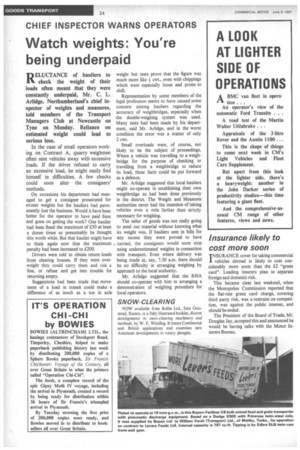Watch weights: You're being underpaid
Page 26

If you've noticed an error in this article please click here to report it so we can fix it.
RELUCTANCE of hauliers to check the weight of their loads often meant that they were constantly underpaid, Mr. C. L. Arlidge, Northumberland's chief inspector of weights and measures, told members of the Transport Managers Club at Newcastle on Tyne on Monday. Reliance on estimated weight could lead to serious loss.
In the case of small operators working on Contract A, quarry weighmen often sent vehicles away with excessive loads. If the driver refused to carry an excessive load, he might easily find himself in difficulties. A few checks could soon alter the consigners' methods.
On occasions his department had managed to get a consigner prosecuted for excess weights but the hauliers had permanently lost the business. Would it have been better for the operator to have paid fines and gone on getting the work? One haulier had been fined the maximum of £.50 at least a dozen times so presumably he thought this worth while. But that haulier might have to think again now that the maximum penalty had been increased to £200.
Drivers were told to obtain return loads from clearing houses. If they were overweight they could carry them and risk a fine, or refuse and get into trouble for returning empty.
Suggestions had been made that movement of a load in transit could make a difference of as much as a ton in axle weight but tests prove that the figure was much more like + cwt., even with chippings which were especially loose and prone to shift.
Representation by some members of the legal profession seems to have caused some concern among hauliers regarding the accuracy of weighbridges, especially when the double-weighing system was used. Many tests had been made by his department, said Mr. Arlidge, and in the worst condition the error was a matter of only 2 cwt.
Small overloads were, of course, not likely to be the subject of proceedings. Where a vehicle was travelling to a weighbridge for the purpose of checking or travelling from a weighbridge to reduce its load, these facts could be put forward as a defence.
Mr. Arlidge suggested that local hauliers might co-operate in establishing their own weighbridge as had been done previously in the district. The Weight and Measures authorities never had the intention of taking vehicles even a mile farther than strictly necessary for weighing.
The seller of goods was not really going to send out material without knowing what its weight was. If hauliers sent in bills for any excess they were proved to have . carried, the consigners would soon stop using underestimated weights in connection with transport. Even where delivery was being made at, say, 7.30 a.m. there should be no difficulty in arranging weighing by approach to the local authority.
Mr. Arlidge suggested that the RHA should co-operate with him in arranging a demonstration of weighing procedure for local operators.
SNOW-CLEARING
NOW available from Rolba Ltd., East Grinstead, Sussex, is a fully illustrated booklet, Recent developments in snow-clearing machinery and methods, by W. E. Weisflog. It traces Continental and British applications and examines new American developments in rotary ploughs.




























































































































